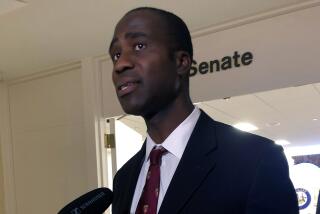Challenge to Military’s Anti-Gay Stance Found in Report Dismissed by Pentagon : Bias: The Defense Department rejected researchers’ advice that it reconsider its policy of excluding homosexuals from the armed services.
- Share via
WASHINGTON — A Defense Department research group has recommended that the armed forces consider ending their policy of discrimination against homosexuals, but the Pentagon has rejected the draft report because it went beyond its mandate.
In the report, the Defense Department’s Personnel Security Research and Education Center in Monterey suggested that the military consider treating homosexuals “as a minority group” instead of viewing homosexuality as a “sin, crime (or) sickness.”
It also urged that the Pentagon start a program of research “to test the hypothesis that men and women of atypical sexual orientation can function appropriately in military units.”
But the Defense Department, which holds that practicing homosexuals should not be allowed to serve in the military, rejected the suggestions.
“The report was merely a draft recommendation, which was not acceptable to the Department of Defense because it was not responsive to the original research request,” a Pentagon spokesman said Sunday.
A co-author of the report, Prof. Theodore R. Sarbin, acknowledged that the study went beyond the Pentagon’s request for a survey of available information on the subject of whether homosexuals in the military pose any security risk.
“We did go beyond our charge,” Sarbin said. “We let the report go where the data suggested it should go.”
Nevertheless, he said, he is completing a report that will focus more closely on the question of whether homosexuals are reliable from a security standpoint. It, too, will conclude that the military has no grounds for such discrimination, he said.
“The traditional view is that homosexuals are vulnerable to blackmail,” Sarbin, a retired professor of psychology and criminology at UC Santa Cruz, said in a telephone interview from his home in Carmel.
“Having a personal secret is what makes one vulnerable. That applies to any personal secret, not just homosexuality,” he said. “It’s not distinctive to homosexuals or heterosexuals.”
He said he expects to forward the new report to the Pentagon in about two weeks. Its findings are virtually certain to renew public debate of the controversial issue.
The Defense Department has long held that practicing homosexuals should not be allowed to serve in the armed forces because they could be vulnerable to blackmail and because their presence could undermine discipline and morale.
The researchers’ draft and the Pentagon’s response to it were first reported Sunday in the New York Times.
The newspaper said it was given the report by members of Congress who believed the Pentagon should change its policies and allow homosexuals to serve in the armed forces.
“The report was an excellent academic survey of the available literature. The problem is that the Defense Department doesn’t want to deal with it,” Rep. Patricia Schroeder (D-Colo.) told the newspaper.
“We asked for an explanation of why the Defense Department killed the report,” she said. “We were told that the (survey’s) mandate was to look at the reliability of homosexuals for security reasons. I found that a distinction without a difference.”
The New York Times also quoted from a letter, written by the Pentagon official who rejected the report, that went beyond the issue of whether the study had exceeded its original purpose. In the letter, Craig Alderman Jr., deputy undersecretary of defense for policy, complained that the research center had no authority to raise the issue of whether homosexuals were fit for service.
Alderman also wrote that the Pentagon found the report “to be technically flawed, to contain subject matter (Judeo-Christian precepts) which has no place in a Department of Defense publication, to reflect significant omissions with respect to relevant court decisions concerning personnel security and to suggest a bias which does justice to neither (the research center) nor the department,” according to the newspaper.
“That was his reading,” Sarbin said of Alderman’s criticism of the report’s reference to bias against homosexuals. “It would be the reading of most people in the Pentagon, because our findings were contrary to Pentagon policy.”
Alderman was not available for comment Sunday.
Sarbin said he was not surprised that his report had met resistance in the Pentagon bureaucracy.
“I don’t think they’d ask me to do it again,” he said.
More to Read
Sign up for Essential California
The most important California stories and recommendations in your inbox every morning.
You may occasionally receive promotional content from the Los Angeles Times.











